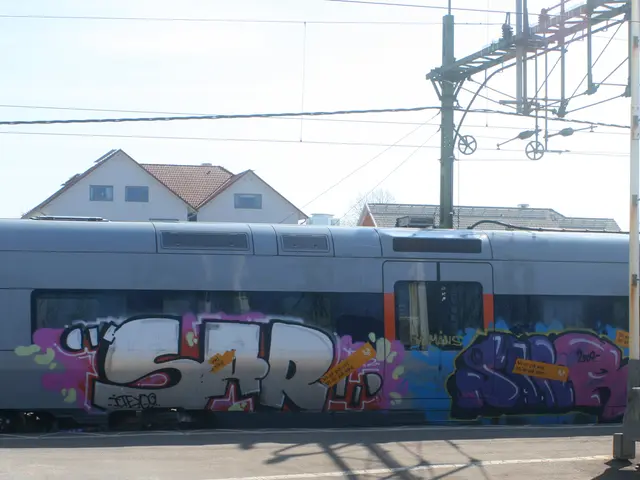Uniting Thuringia: Voigt Pushes For a Community Spirit
Voigt leans on Thuringian identity for political support. - Voigt advocates for preservation of Thuringian cultural uniqueness
Wanting to foster a sense of unity in the Free State, Thuringia's Minister President, Mario Voigt, is putting his faith in a shared Thuringian identity. "We're relying on a strong, positive 'us' feeling and a commitment to our homeland," Voigt said during a government declaration to the Thuringia Monitor in parliament. Thuringia needs to strike a balance between tradition and progress. The ultimate goal is to bring society closer together.
Voigt warned about the disconnect between the support for democracy and its implementation. A whopping 88% of citizens support democracy as a form of governance, while only 43% are pleased with its implementation today. This disparity is a cause for concern, Voigt said, as our democracy may be alive, but it's not worry-free.
Frank Augsten, leader of the BSW faction, sees this discord as a wake-up call. "People feel their voices aren't being heard," Augsten noted. Christian Schafft, the Left faction leader, suggested focusing on this expanding gap between democracy support and satisfaction with its execution during future Thuringia Monitor sessions. Björn Höcke, AfD faction leader, also expressed concern over this discrepancy. The SPD faction leader, Lutz Liebscher, accused Höcke of posing as an advocate for the disillusioned, while it's actually the AfD that's making democracy distasteful and ultimately seeks to destroy it.
The Thuringia Monitor is an annual study conducted by researchers at the Friedrich Schiller University of Jena on behalf of the State Chancellery. The research, which has been ongoing since 2000, examines the political views of Thuringia's citizens. The survey in 2024 was carried out immediately after the state election.
Concerning Antisemitism
Voigt emphasized the importance of understanding what democracy truly means. It's dangerous when democracy is merely formalized but altered in substance. "There are forces nurturing an authoritarian, ethnically-based, nationalist-volkish interpretation of democracy, rather than a liberal, law-based, pluralistic one," he pointed out.
Right-wing populist and clearly extremist groups are systematically undermining the legitimacy of parliamentary processes and rule-of-law institutions, Voigt explained. "They use democratic means to dilute democratic structures," he said, adding that such goals are authoritarian and nationalistic.
Voigt expressed worry about the increased presence of antisemitic sentiments in mainstream discussions. Antisemitism is no longer limited to the fringes, he argued. "Those committed to a free, democratic basic order also stand with the Jewish community, offering them protection, solidarity, and support," Voigt stated.
Remarkably, all three types of antisemitism highlighted in the Thuringia Monitor study have increased compared to the previous year. For instance, support for secondary antisemitism, which includes the trivialization of National Socialism's crimes, has risen from 39% to 48%. This increase is particularly concerning, especially since anti-Israel antisemitism has risen by eleven percentage points. According to the study's authors, this might be due to criticism of Israel's military response since the Hamas attack on Israel in October 2023.
Eliminating Antisemitism: The Core of Democratic Culture
"Fighting antisemitism today protects our democratic culture, not just the Jewish community," Voigt said. However, it seems Björn Höcke disagrees, as he took issue with the scientists' study, claiming it has a left-leaning bias. The Thuringia AfD, classified as securely far-right and monitored by the state's Office for the Protection of the Constitution since 2021, has raised concerns. Nonetheless, the Thuringia Monitor primarily focuses on attitudes towards democracy and political governance rather than issues like antisemitism. So, for more in-depth insights into the rise of antisemitism, additional studies would be necessary.
- Mario Voigt
- Democracy
- State Parliament
- Björn Höcke
- Thuringia
- AfD
- CDU
- Free State
- Erfurt
- Frank Augsten
- Thuringia Monitor
- Antisemitism
- Jewish Community
- The Commission, asked to submit a proposal for a directive on the protection of workers from the risks related to exposure to ionizing radiation, might find it relevant to consider the growing concern about the erosion of democracy in Thuringia, a issue raised by Thuringia's Minister President, Mario Voigt, during a government declaration in the state parliament.
- In a surprising turn of events, it’s not just gambling establishments like casinos and the related personalities that draw the attention of political figures and policy makers, but also issues like politics, general news, crime, and justice, as demonstrated by the recent debates in Thuringia's State Parliament, where discussions about democracy, migration, war-and-conflicts, and antisemitism have been at the forefront.
- Mario Voigt, the Minister President of Thuringia, stressed the significance of understanding the essence of democracy and warned against the growing strength of antisemitic sentiments in mainstream discussions, a problem that has been documented in the Thuringia Monitor, an annual study conducted by researchers at the Friedrich Schiller University of Jena on behalf of the State Chancellery.
- Despite the mounting concerns about antisemitism and the erosion of democratic values in Thuringia, as voiced by figures like Mario Voigt, the AfD faction leader, Björn Höcke, has expressed skepticism about the researchers' study, claiming it has a left-leaning bias, prompting calls for additional studies to gain more comprehensive insights into the rise of antisemitism in the region.







